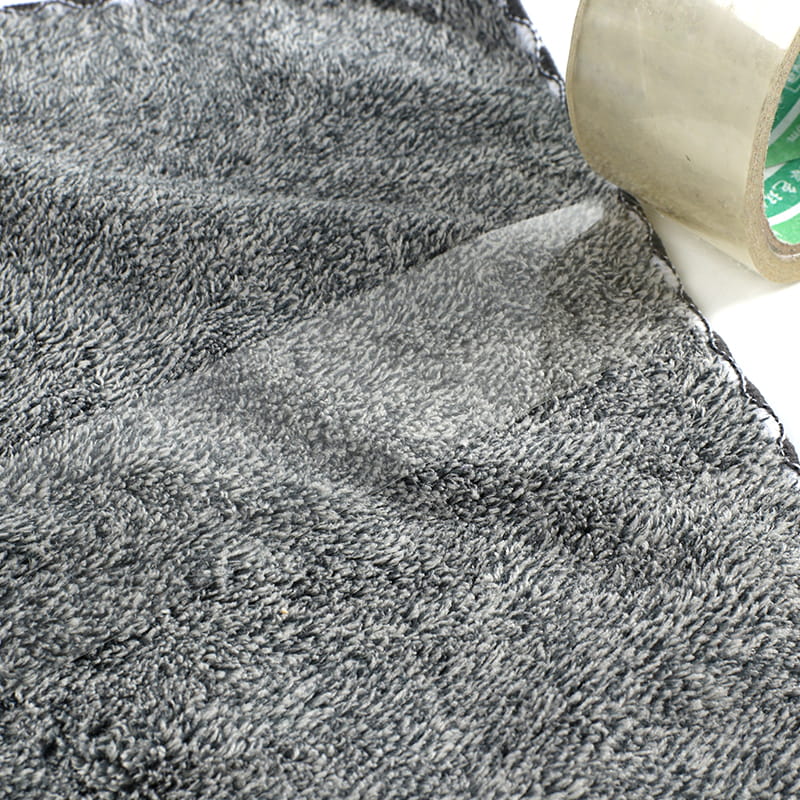We are a national high-tech enterprise. At present, there are many kinds of self-woven and cooperatively processed fabrics, including microfiber warp-knitted towel cloth, weft-knitted towel cloth, coral fleece, etc.
Preventing lint or fibers from car wash towels sticking to the vehicle surface during the drying process involves several steps and techniques:
Pre-Wash the Towels: Before using car wash towels on your vehicle, it's essential to conduct a thorough pre-wash to eliminate any residual contaminants or loose fibers that may be present. Wash the towels separately from other laundry items using a gentle detergent and lukewarm water. Avoid using fabric softeners or bleach, as these substances can leave behind residues that compromise the towels' lint-free properties.
Use a Lint-Free Drying Method: Employing a lint-free drying method is crucial to preventing lint or fibers from adhering to the vehicle surface during the drying process. Instead of dragging the towel across the paintwork, which can increase the risk of lint transfer, opt for gentle patting or blotting motions to absorb excess water. Consider using specialized drying aids such as drying microfiber waffle weaves or silicone-bladed squeegees for a streak-free finish.
Inspect Towels Before Use: Prior to each use, meticulously inspect car wash towels for any signs of loose fibers, lint, or contaminants that may compromise their effectiveness. Utilize a bright light source to identify any imperfections, and address them promptly by removing any stray particles with a lint roller or by gently shaking the towel outdoors. This proactive approach helps ensure that only clean, pristine towels come into contact with your vehicle's delicate surfaces.
Avoid Fabric Softeners: Fabric softeners and similar additives contain chemicals that can leave behind oily residues on car wash towels, diminishing their absorbency and increasing the likelihood of lint transfer. Opt for detergent specifically formulated for microfiber materials, as these products are designed to effectively cleanse the towels without leaving behind any undesirable residues. Additionally, consider using vinegar as a natural fabric softener alternative, as it helps to break down detergent residues and restore the towels' absorbency.
Wash Towels Separately: To minimize lint accumulation and prevent cross-contamination, adhere to a strict practice of washing car wash towels separately from other laundry items. This precaution is particularly important when laundering towels alongside materials prone to shedding lint, such as cotton-based textiles or clothing with rough textures. Washing towels in isolation helps maintain their cleanliness and ensures optimal performance during subsequent use.
Use Proper Washing Techniques: Proper washing techniques are essential for preserving the integrity and effectiveness of car wash towels. When laundering towels, use a gentle cycle and avoid washing them with items that have sharp edges or abrasive textures that could cause damage. Additionally, refrain from using excessive heat during the drying process, as high temperatures can weaken the fibers and increase the risk of lint shedding. Instead, opt for a low-heat setting or air drying to maintain the towels' softness and absorbency.
Dry Towels Properly: After laundering, take care to dry car wash towels properly to prevent lint or fibers from adhering to the vehicle surface. If using a dryer, select a low-heat setting and remove the towels promptly once they are dry to the touch. Avoid over-drying, as this can cause the fibers to become brittle and more prone to shedding. Alternatively, air drying is an excellent option for preserving the towels' integrity and minimizing the risk of lint transfer.
4PK Antibacterial Gypsophila Coral Fleece Car Towel

4PK Antibacterial Gypsophila Coral Fleece Car Towel


 English
English Espaol
Espaol русский
русский عربي
عربي 简体中文
简体中文
















